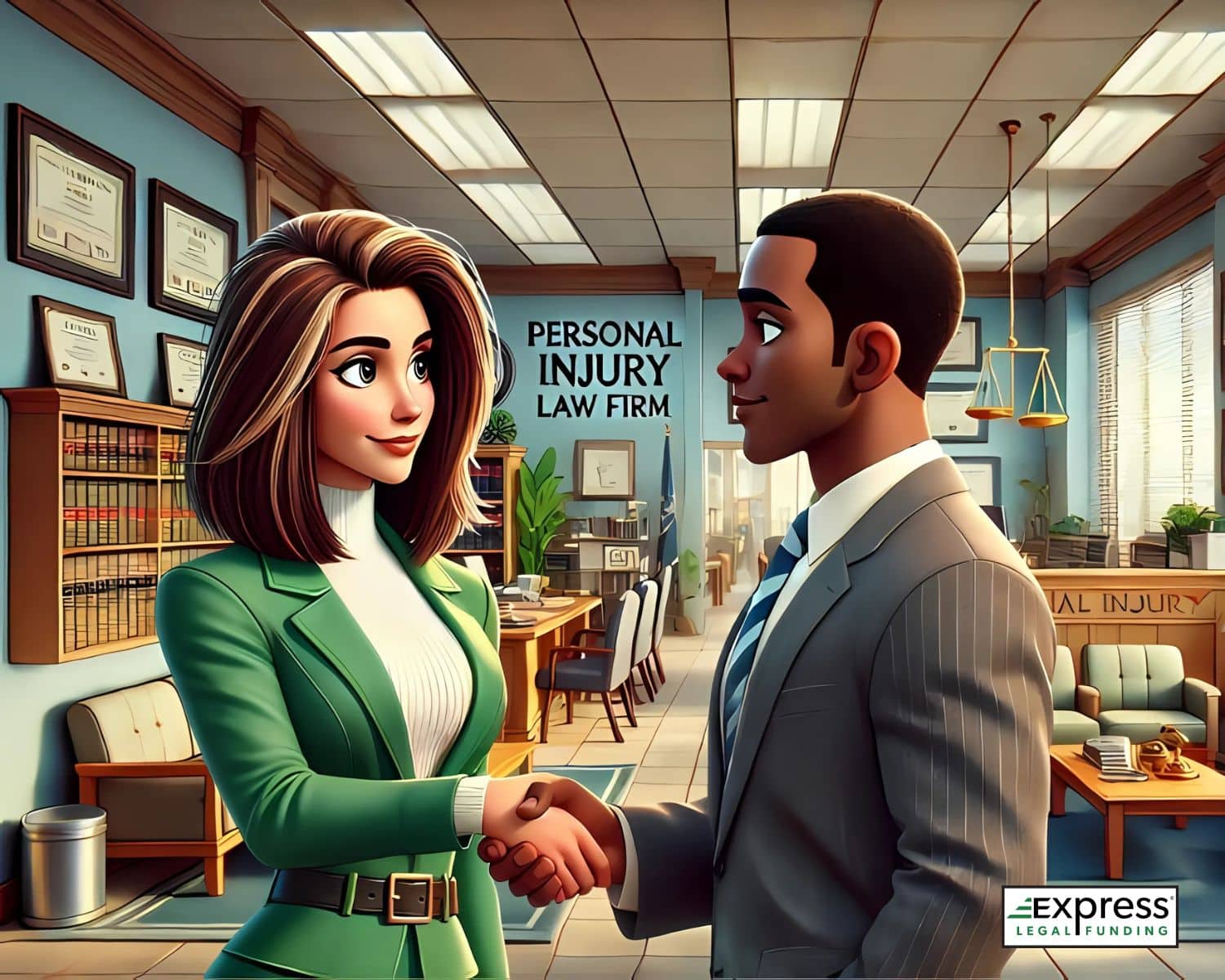
Considering becoming a personal injury lawyer as your career, but want more details and practical advice?
While it is a field of law that promises the allure of significant rewards it also has its own array of unique challenges.
In this guide, our team at Express Legal Funding offers its expert advice and research information, giving you an unbiased and in-depth look at the career path and helping you decide if it is the right fit for you.
The Good, the Bad, and the Gritty Truth of Personal Injury Law
In the following sections, we review and provide insight into 11 facts anyone wanting to become a personal injury lawyer in the US should know, helping you examine this career option’s benefits and drawbacks to better prepare and set realistic expectations.
Let’s start with these two infographics to give you a better idea of what you can expect on the job and a taste of what this article will discuss.
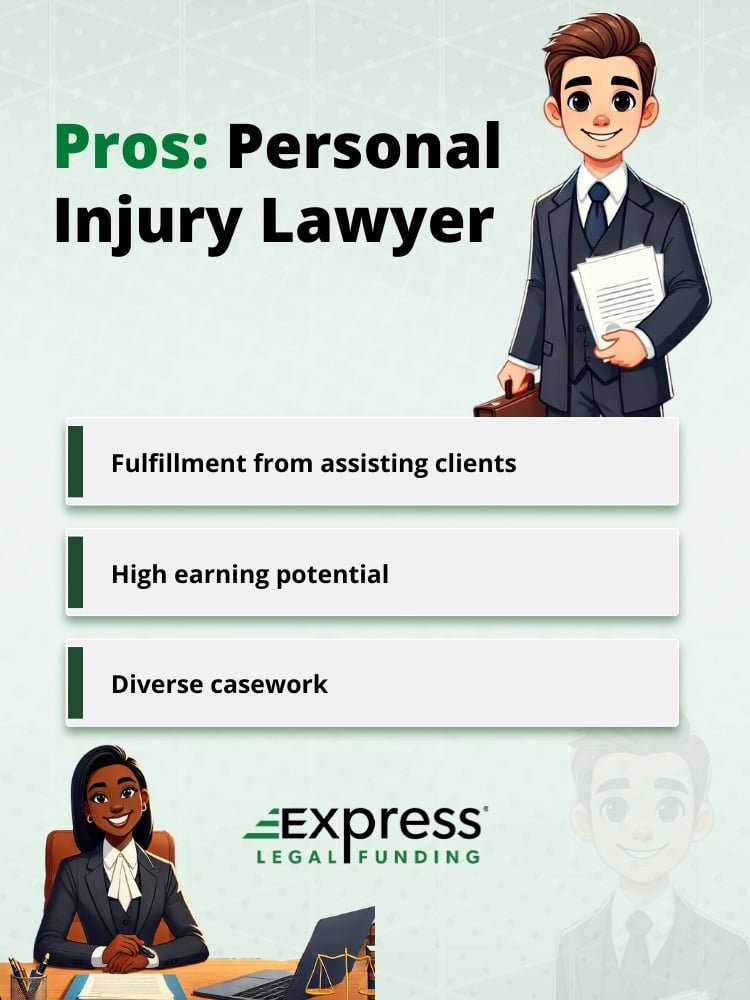
Now, let us look at the downsides which are relatively unique to the personal injury law field.

An Overview of a Career as a Personal Injury Lawyer
Personal injury law focuses on offering legal help to individuals injured due to someone else’s negligence or intentional tort actions like assault.
As a personal injury lawyer, your primary goal will be to advocate for your clients and ensure they receive fair civil compensation for their physical, emotional, and financial suffering. This involves:
- Navigating complex legal processes.
- Negotiating with insurance companies.
- Aiming for fair settlements or court judgments.
The Importance of Upholding a Robust Ethical Code
Maintaining high ethical standards is essential for personal injury lawyers. They must do what is legally best for their clients, avoid conflicts of interest, and adhere to ethical guidelines set by regulatory bodies.

Transparent communication and fair billing practices are ways to build trust and contribute positively to the profession’s integrity.
11 Factors To Consider Before Becoming a Personal Injury Lawyer
Continue reading to gain a realistic understanding of what it takes to become a personal injury lawyer. This career path offers rewards and challenges, and it’s essential to weigh these carefully before deciding.
Weighing the positives and challenges will help you make an informed choice about your future in personal injury law. Learn these 11 concepts and factors to empower yourself to lead a successful career as a personal injury lawyer.
1. Gauging Essential Skills
To thrive as a personal injury lawyer, you must possess a variety of crucial skills. Use this self-assessment to determine if you have the right skills and areas of interest for this career path. If you identify skills where you are lacking, consider the provided solutions to improve them.
Analytical and Critical Thinking
- Are you able to evaluate and investigate claims meticulously?
Example Scenario: You are handling a car accident case in which the client claims the other driver was at fault. To build a strong case, you will need to gather police reports, witness statements, traffic camera footage, and medical bills. - Can you formulate persuasive legal arguments?
Example Scenario: You are representing a client in a slip-and-fall case. The defense argues that the client was not paying attention, and the hazard was clearly marked.
Assuming strict liability is not in place, you need to construct a persuasive argument that the landlord or property owner was negligent in maintaining a safe environment.
Empathy and Compassion
- Are you able to establish client trust through empathy and compassion?
Example Scenario: You are working with a client who has suffered a severe injury and is emotionally distressed. They are worried about their future and financial stability. In this situation, it is critical that you demonstrate empathy and make the client feel you are an advocate for them, which may involve referring them to a trusted company like Express Legal Funding to learn about their non-recourse pre-settlement funding options. - Can you handle sensitive situations with care?
Example Scenario: You are handling a wrongful death case where the family is grieving and seeking justice for their loved one. Emotions are high, and you need to navigate the situation with sensitivity.
Effective Client Communication
- Do you have strong negotiation and advocacy skills?
Example Scenario: You are negotiating a settlement for a client who was injured in a company workplace accident. The insurance company offers a low settlement, not commiserate with your client’s injuries and lost wages, and you need to negotiate fair compensation for your client.
Legal Expertise
- Are you knowledgeable about personal injury law?
Example Scenario: A new law has been passed that affects the statute of limitations for personal injury claims. You will need to understand how this change impacts your current and future cases. - Are you committed to continued education and training?
Example Scenario: You have the opportunity to attend a specialized training program on advanced trial techniques. This program will help enhance your courtroom skills, benefit your clients, and boost case outcomes.
Self-Assessment Summary:
- If you answered “yes” to most of these questions, you likely have the essential skills needed to succeed as a personal injury lawyer.
- If you identified areas for improvement, take proactive steps to develop these skills through education, training, and practical experience. Here are some tips for you to use in this effort.
Tips for Improvement
- Develop your analytical skills by practicing case analysis and evidence evaluation. Take courses in legal research and investigation techniques. Participate in mock trials or legal clinics to gain hands-on experience in evaluating claims.
- Enhance your critical thinking and argumentation skills by studying landmark cases and practicing legal writing. Join debate clubs or moot court competitions to refine your ability to construct and present persuasive arguments.
- Develop your empathy by actively listening to clients and understanding their perspectives. Volunteer at legal aid organizations to gain experience working with clients in distress. Shadow experienced attorneys to observe how they build trust with their clients.
- Improve your emotional intelligence by taking conflict resolution and counseling courses—practice handling sensitive situations through role-playing exercises. Seek feedback from mentors on your approach to managing client emotions.
- Enhance your communication skills by participating in negotiation workshops and public speaking courses. Practice advocacy through moot court and mock trial competitions. Observe experienced negotiators and advocates to learn practical techniques.
- Commit to continuous education by attending legal seminars, reading legal journals, and participating in professional development courses. Join professional associations related to personal injury law to stay informed about industry trends.
- If you are already a lawyer, consider attending continued legal education (CLE) courses on personal injury law topics and attending legal conferences to expand your knowledge and skills.
2. Educational Commitment
The general educational requirements to become a lawyer in the US include:
- A four-year undergraduate bachelor’s degree from an accredited college or university
- Three years of law school
- Additional time for bar exam preparation

This can be demanding financially as well as mentally. That said, investing and acing your courses with flying colors can lead to a rewarding and impactful career.
How you can overcome this challenge
Financial Aspects
- Understand if your educational institution can offer support via research scholarships, grants, and loan options to manage the financial requisites effectively.
- While the thought of having to repay a student loan can be daunting, remember it is an investment in yourself, as your earning potential will significantly increase after you begin practicing law.
Academic Rigor
- Law school and its curriculum are demanding. Before enrolling, assess your readiness to handle intensive reading, writing, and critical thinking tasks. Helpful tip: Regarding writing, the website https://papersowl.com/pay-for-essay can be of great help to you, as they do proofreading, editing, and writing.
- Read about what you can expect from the course and the skills you need to develop for your legal career.
3. Bar Examination Challenges
The bar exam is a rigorous test that requires extensive preparation and is demanding both mentally and emotionally.
It typically spans two to three days and includes multiple-choice questions, essays, and performance tests that assess your knowledge of the law and your ability to apply it.
The exam tests a wide range of legal topics, including constitutional law, contracts, criminal law, evidence, and more. Each state has different bar exam formats and requirements.
For example, most states have adopted the Uniform Bar Exam (UBE), which is standardized and allows for easier transfer of scores and evaluate a lawyer’s competence to practice between jurisdictions, while others have their own unique exams.
How you can overcome the challenge
Exam Preparation

- Prepare a structured study plan and follow the timeline to cover each topic. Utilize bar review courses, practice exams, and study groups to enhance your preparation.
- Remember that consistency is key here. Set daily or weekly goals to keep yourself on track and break down your study material into manageable sections.
- Practice mindfulness and stress-relief techniques, such as meditation or exercise, to maintain your mental well-being.
State-specific Guidelines
- Research the specific requirements for the state where you plan to practice, as each state has different bar exam formats and requirements. Use state-specific study materials and resources to ensure you are well-prepared for the unique aspects of your state’s exam.
- Consider taking the Uniform Bar Exam (UBE) if you plan to practice in multiple states, as it offers more flexibility.
- Additionally, familiarize yourself with the Multistate Professional Responsibility Examination (MPRE), which tests your knowledge of professional conduct. This is required in most states.
Retake Possibility
- Not everyone passes on the first try. When planning to retake the exam, it is crucial to have a positive attitude and not be too hard on yourself to improve your odds of passing.
- Reflect on your previous attempt to identify areas for improvement. Create a new study plan that addresses your weaknesses and builds on your strengths.
- Seek support from mentors, colleagues, or a tutor to help you prepare more effectively.
- Many successful lawyers have faced this challenge and persevered, so stay determined and focused on your goal.
4. Real-World Experience
Hands-on experience is essential to excel in any profession. Applying for and accepting internships and clerkships will give you a clear idea of what being a personal injury lawyer is like.
These positions often involve long hours and challenging tasks without pay, but the hands-on experience you gain is invaluable and can lead to job offers post-graduation.

Internships will help you assess your willingness to start at the bottom and work your way up and provide opportunities for you to be around constant networking and self-promotion, which you should expect if you continue pursuing this career path.
How to overcome the challenge of lacking experience
Internships and Clerkships
- Leverage the opportunity to work closely with experienced attorneys, observe court proceedings, and assist with case preparation.
- This exposure helps you understand the practical aspects of legal work and develop essential skills such as legal research, writing, and client communication.
- Dealing with real clients and cases helps you build confidence and competence.
Building a Network
- While daunting, building a professional network can lead to mentorship opportunities and job prospects. You should attend nearby events, join and actively participate in online communities, and attend law school workshops, all of which are excellent avenues to growing your network.
- Research the availability of networking opportunities in your desired region, such as local bar associations, legal conferences, and community events. Actively participate in these events to build relationships with other legal professionals and potential clients.
- Join local business and community organizations to expand your network and increase your visibility. Networking can help you build a client base and establish your practice in the community.
- Remember that this activity is a two-way street; offer your support and assistance to others, and the community will be more likely to reciprocate.
5. Emotional and Ethical Considerations
Personal injury cases often involve distressed clients. Reflecting on your ability to handle emotionally charged situations with empathy and professionalism is essential.
Still, helping clients through difficult times can be incredibly fulfilling. Moreover, in a career as a personal injury lawyer, you will face many ethical dilemmas and challenges where legal and moral obligations may conflict.
The emotional toll of dealing with distressing cases and clients is not an easy feat, as constant exposure to clients’ trauma and the high stakes of legal outcomes can lead to emotional exhaustion and burnout.
How you can overcome this challenge
Emotional Balance
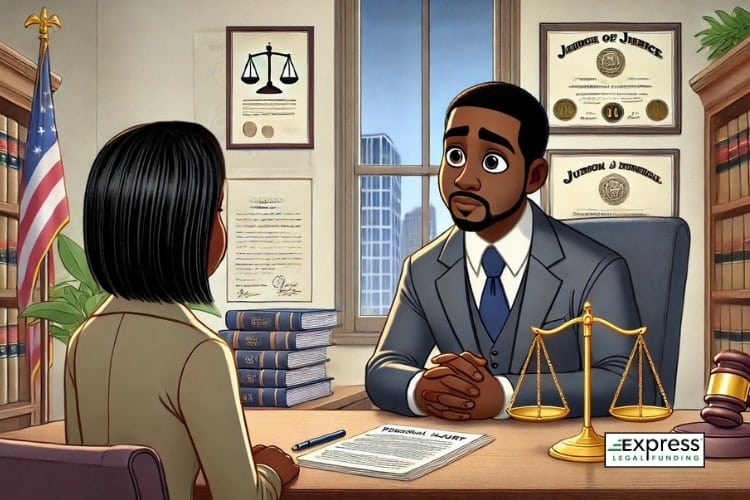
- Develop strong interpersonal skills and practice active listening to understand your client’s needs and concerns. Show empathy and provide clear, compassionate communication.
- Consider seeking training in emotional intelligence and client management to enhance your ability to support clients effectively.
- Prioritize self-care and mental health. Establish a routine that includes regular exercise, hobbies, and relaxation techniques.
- Consider seeking support from a therapist or counselor to process your emotions and develop coping strategies. Building a strong support network of family, friends, and colleagues can also provide emotional support and fortify your resilience.
Ethical Dilemmas
- Familiarize yourself with the American Bar Association’s Model Rules of Professional Conduct and your state’s specific ethical guidelines. When faced with ethical dilemmas, seek guidance from mentors, colleagues, or the relevant state bar.
- Regularly participate in continued legal education (CLE) courses on ethics to stay informed and prepared to handle challenging situations.
6. Financial Realities
As a personal injury lawyer, earnings can vary widely based on location, experience, and case outcomes.
Factors such as geographic location, years of experience, and the nature of cases handled can significantly impact earnings.
Running a practice involves more than just legal work. It often requires you to handle business aspects like billing, marketing, and cost of client acquisition.

Effective business management is essential in your quest to create a thriving injury law practice.
Law school debt can be substantial, so it is imperative to factor having to repay student loans into ongoing expenses and not get behind while building your career.
How you can overcome this challenge
Income Fluctuations
- Research the average income for personal injury lawyers in your desired location and set realistic financial goals.
- Diversify your case portfolio to include a mix of high-profile and smaller cases to stabilize your income and expenses.
- Consider working in a firm initially to gain experience and financial stability with a salary before starting your own practice.
Practice Management
- Develop a basic understanding of business management principles. Consider taking courses or workshops on topics such as accounting, marketing, and client management.
- Utilize legal practice management software to streamline administrative tasks.
- Hire administrative staff or outsource tasks to focus more on legal work when possible.
- Don’t overlook the importance of assessing your readiness to handle business aspects like administrative tasks and client acquisition. If you get behind and fail to meet deadlines, you could face severe repercussions (such as bar complaints and hearings).
7. Work-Life Balance
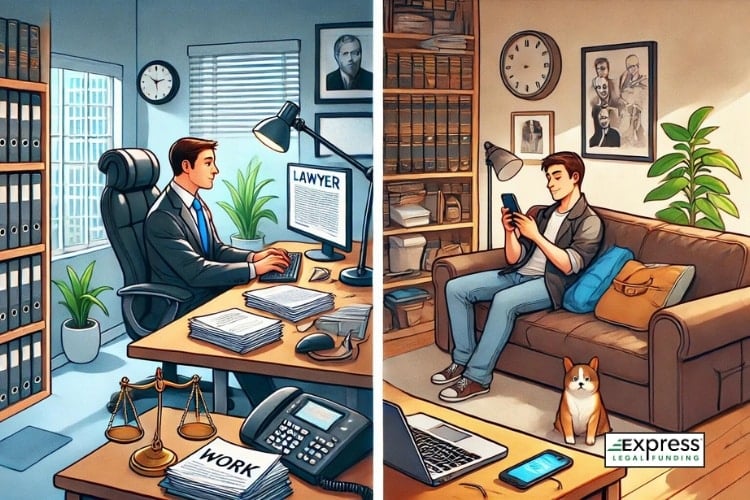
The legal profession often requires long hours, including nights and weekends, to meet client needs and court deadlines, which can negatively impact your personal life and relationships.
Likewise, high stress levels are typical, and burnout is likely if not managed effectively. While not mutually exclusive, providing the best service to your personal injury clients can make it difficult to set boundaries and devote time to your own interests and health.
Here are some strategies to help you overcome these challenges:
Long Hours
- Develop strong time management skills to balance work and personal life. Prioritize tasks and set boundaries to ensure you have time for yourself and your loved ones.
- Schedule regular breaks and personal time to recharge. Communicate openly with your family and friends about your work commitments to manage expectations and maintain healthy relationships.
Stress Prevention

- Implement stress management techniques such as mindfulness, meditation, and regular exercise.
- Create a support system of colleagues, friends, and family to share your experiences and seek advice.
Personal Time Prioritization
- Set clear boundaries between work and personal life.
- Consider adopting different communication channels for work and your personal life, such as different phone numbers and emails. While it is essential to address your client’s needs, you also need to maintain a private space for yourself and your loved ones.
- Learn to say no to additional work when necessary to protect your personal time. Schedule regular personal time for activities you enjoy or to utilize self-care practices.
- Use time management tools and techniques to stay organized and efficient, allowing you to allocate time for yourself.
8. Career Advancement
It is common knowledge that the legal field is fiercely competitive, which is why those in it must continuously prove themselves to stay at the top of their game. Deciding to specialize in personal injury law means committing to a specific area, something you must ponder over.
This decision must align with your long-term career goals. No doubt, specialization can make you an expert in your field and increase your marketability.
When it comes to advancing your career, mentorship becomes a quintessential factor. The right mentor can help you refine your weaknesses, solidify your strengths, and help you use both to your advantage.
That is easier said than done, as the real challenge lies in finding the right mentor.
How you can overcome this challenge
Fierce Competition

- Invest in keeping yourself updated with the latest developments in the legal space. Keep abreast of prominent case files and verdicts that have reshaped how the law is perceived in the country.
- Seek out challenging cases and opportunities to demonstrate your abilities. Devote time to network with other legal professionals to build relationships and engage with them regularly to get new and diverse perspectives and working styles. For all you know, the points you pick along the way may help you in future cases. Keep a welcoming mind and be ready to absorb information.
Specialization Decisions
- When you decide on a career path as a personal injury lawyer, it must align with your interests and the vision you have for your career. Specialization requires additional effort but is worth it in terms of career fulfillment and financial aspirations.
- By specializing in an area, you can enhance your expertise and marketability, leading to more career opportunities and recognition. It becomes easier to stand out from the crowd and make a mark for yourself with your niche expertise.
- Research the benefits and challenges of specializing in this area. Before committing to one, we suggest gaining exposure to various areas of law before making a decision.
Mentorship and Guidance

- Attend networking events and conferences to expand your connections. Meet and connect with individuals who have experience and success in your desired area of law.
- Be open to feedback and willing to learn from their experiences. Build relationships with potential mentors by showing genuine interest and respect for their expertise.
9. Client and Case Management
Clients in personal injury claims may be dealing with significant trauma and expect a lot from their legal aid team. Helping clients can be deeply rewarding yet draining at the same time.
Handling multiple cases simultaneously requires excellent organizational skills and the ability to “context switch” between various types of injury claims.
Knowing the details of a particular case inside and out is critical to getting the best for your clients. Still, even then, not all verdicts will be favorable, as most things will be out of your control.
Trust and Client Expectations
- Develop strong interpersonal skills to build trust and rapport with clients, keeping them informed about the progress of their cases.
- Trust is crucial for them to completely open up about incidents leading to the lawsuit. As a lawyer, you need all these details to build a strong case. It’s how you can avoid negotiating from a place of weakness and mitigate the odds of being blindsided by the defense.
- Communicate clearly and honestly with clients about what they can expect from the legal process. Earning their trust will help your clients hear what you are telling them, both the good and the bad, and set realistic expectations based on the facts of their cases.
Case Management
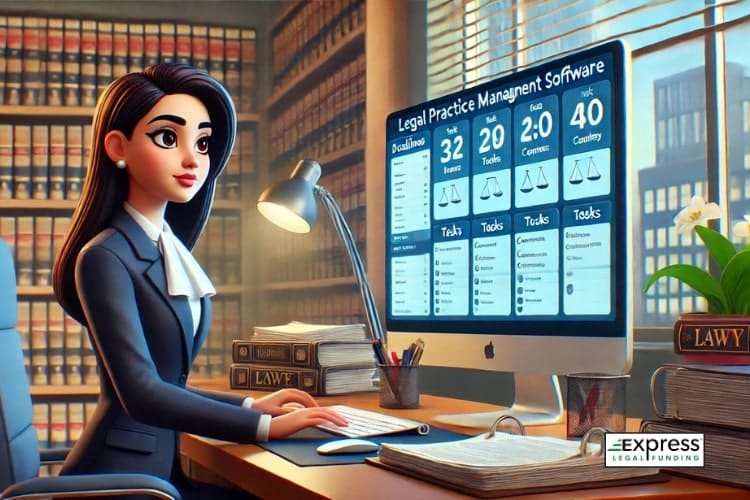
- Use legal practice management software like Clio or PracticePanther to track deadlines, tasks, and client communications.
- Develop and maintain standard operating procedures for organizing and prioritizing your case flow.
- Delegate tasks to support staff when possible to free up your time for more critical work. Regularly review and adjust your workload to ensure you can manage it effectively.
Verdict Uncertainty
- Develop resilience and a positive mindset to cope with uncertainty and disappointments. Make peace with the fact that not all cases can be won in your client’s favor.
- The important thing is to give your best each time. Reflect on each case to identify areas for improvement and learn from your experiences. All of which will help you become a better lawyer.
- Seek support from colleagues and mentors to gain perspective and advice. Focus on the aspects of your work that you can control and strive to provide the best possible representation for your clients.
- Learning from each case (successes and failures) can improve your skills and resilience.
10. Technological Adaptation
Technology has penetrated all aspects of our lives, including the legal field.
That said, new legal technology in the lawyer arena brings challenges and potential pitfalls, especially when generative AI is involved (an area where humans reviewing the work and maintaining proper documentation is paramount).

How you can overcome this challenge
- Explore software and tools in the legal field, and you will find many that can automate repetitive tasks and save you a lot of time, resources, and even money. While many attractive options are available, be mindful to hone in on tools that will make the most significant difference for you. They all come with privacy risks, so adjust accordingly by following the recommended precautions.
- If you plan to work remotely, create a dedicated workspace at home to minimize distractions and maintain productivity. Use video conferencing and collaboration tools like Zoom or Google Meet to stay connected and manage your work.
11. Market Demand
The demand for personal injury lawyers varies based on location and market conditions. For example, metropolitan areas like Atlanta, Dallas, and Miami may have a higher concentration of cases due to factors such as traffic volume, economic activity, and crime.
Cities with quickly growing populations and economies will have a higher demand for legal services.
The drastic disparity between regions, combined with some already being strongholds for more established firms, makes it challenging for an up-and-coming personal injury lawyer looking to hang their shingle (start their own business/go out on their own).
How you can overcome this challenge
Local Research
- If you have options of where to base your practice, conduct thorough research into the local market of each to understand the demand for personal injury lawyers in your desired area. This research includes analyzing state laws, accident rates, economic activities, and the presence of major industries.
- Use this information to identify areas with higher demand and potential for growth. Consider areas with expanding industries, increasing traffic, and higher accident rates. Make strategic and data-backed decisions about where to focus your practice.
- Evaluate the demographics and size of the potential client base in your desired service area. Analyze factors such as population density, age distribution, and economic status. These factors impact the demand for personal injury lawyers among people living in the area.
Online Marketing

- Online and SEO marketing is an immensely valuable growth strategy for personal injury lawyers. It increases their visibility to potential clients, allowing them to reach a wider audience and attract more leads while also bypassing more expensive advertising methods like billboards, TV, and radio ads.
- Methods include generating leads via lawyer listing sites, pay-per-click (PPC) advertising, social media advertising (cost per 1000 impressions), search engine optimization (SEO), and an email newsletter subscription. A mixture of these methods is typically the most effective and sound marketing plan, as it will diversify your traffic sources.
- For most attorneys, especially those still in the early years of building their law practices, hiring an outside agency is more cost-effective than trying to accomplish it themselves or building an in-house team.
- SEO management services, such as WordLift, specialize in sustainable growth for law firms through content creation, structured data, and creating knowledge graphs. They help law firm sites rank higher on search engines like Google or Microsoft’s Bing and strengthen brands while avoiding SEO spam tactics.
Personal Injury Lawyers: Champions of Justice and Compensation
Personal injury lawyers play a crucial role in the legal system. They advocate for individuals harmed by others’ negligence or recklessness and work hard to secure fair compensation for their clients from insurance companies, employers, or other liable parties.
Advantages of Pursuing a Career as a Personal Injury Lawyer
The top pros of being a personal injury lawyer include:
Assisting Clients
One of the main benefits is the fulfillment of helping others. You can guide clients through the legal system and ensure they receive fair compensation to cover medical expenses, lost wages, and other damages.
Whether dealing with a dog bite incident or a severe motorcycle accident involving a car, your expertise and compassion can significantly impact their lives.
Atlanta-based attorney M. Denzell Moton speaks to the concept of finding meaning in helping clients with the following words of insight he shared with our editorial team,
One of my favorite aspects of being a compensation lawyer, specifically in personal injury, is the profound opportunity to assist clients through some of the most challenging times of their lives.

Read more insights about the fulfilling aspects of being a personal injury attorney.
Financial Rewards
This career can be financially rewarding, especially when operating on a contingency fee basis (no win, no pay attorneys).
Your compensation will be a percentage of the settlement or award obtained for your client, leading to substantial earnings, particularly in successful cases.
Diverse Casework
You will encounter a wide range of cases, from workers’ compensation claims to product liability issues (e.g., for harm caused by recalled CPAP machines or faulty knee replacement parts).
This diversity keeps the work engaging and provides an opportunity to develop expertise in various aspects of personal injury law.
Professional Development
The personal injury law sector offers numerous growth opportunities. Engaging in continuing education, attending conferences, and becoming a thought leader can enhance your expertise and reputation.
Disadvantages of a Career in Personal Injury Law
The top cons of being a personal injury lawyer include:
Emotional Stress
While helping others is rewarding, the emotional burden of addressing clients’ traumatic experiences can be substantial. Implementing effective coping strategies is essential to managing this stress.
Financial Risk
Operating on a contingency fee basis comes with financial risks. If a case is lost, you will not receive compensation for the time and effort invested.
Furthermore, advancing costs for expert witnesses and court fees can pose a financial strain, as the client will not be responsible for repaying you for them when there is no recovery from the claim.
Challenging Work Environment
The demanding nature of personal injury law requires long hours, high-stakes litigation, and constant pressure to achieve optimal results. Strong organizational skills and the ability to excel under pressure are crucial.
Public Perception

Personal injury lawyers often face a negative public perception as litigious “ambulance chasers,” which can complicate efforts to build trust with clients and the community. Maintaining a professional and ethical approach is vital to mitigating these challenges.
Assessing the Suitability of a Career as a Personal Injury Lawyer
Pursuing this career path is both rewarding and challenging. You can make a well-informed decision by evaluating the pros and cons and understanding the foundational legal principles.
Engaging with seasoned personal injury lawyers can offer valuable insights and mentorship, assisting you in determining if this career aligns with my goals and aspirations.
Useful Resources
- Information about Personal Injury Law: Provided by the American Bar Association.
- American Association for Justice: Provides lawyers with the information and professional assistance needed to serve clients successfully and protect the democratic values inherent in the civil justice system.
Career as a Personal Injury Lawyer FAQs
The following frequently asked questions provide additional context and are useful for anyone considering becoming a personal injury lawyer.

Who is a personal injury lawyer?
A personal injury lawyer specializes in cases where individuals have been injured due to someone else’s negligence or intentional actions. Their primary role is to advocate for clients to ensure they receive fair compensation for their injuries and associated damages.
What are the main responsibilities of a personal injury lawyer?
- Case Evaluation: Assess the merits of a case and determine the potential for successful outcomes.
- Legal Research: Conduct thorough research to support case strategies.
- Client Representation: Advocate for clients during negotiations with insurance companies or in court.
- Preparation and Filing: Prepare legal documents, file lawsuits, and manage the legal process.
- Trial Advocacy: Present cases in court, including examining witnesses and presenting evidence.
What kind of education and qualifications are required to become a personal injury lawyer?
To become a personal injury lawyer in the United States, you will need:
- Undergraduate Degree: A bachelor’s degree.
- Law Degree: A Juris Doctor (JD) from an ABA accredited law school.
- Bar Examination: Passing the bar exam in the state where you wish to practice.
- Continued Legal Education: Ongoing training and education to stay current with legal developments in personal injury law.
What are some strategies for managing the stress and emotional burden of personal injury law?
- Self-Care: Implementing effective coping strategies and maintaining a work-life balance.
- Professional Support: Seeking mentorship and support from experienced colleagues.
- Mental Health Resources: Utilizing professional counseling or peer support networks.
How important is ethical practice in personal injury law?
Maintaining high ethical standards is paramount. Personal injury lawyers must act in their client’s best interests, avoid conflicts of interest, adhere to ethical guidelines, and practice transparent communication and billing.
How can I assess the local market conditions for personal injury law?
Research the demand for personal injury lawyers in your area by examining local market trends, speaking with practicing lawyers, and analyzing case volumes in regions with higher concentrations of claims, such as metro areas.
Final Thoughts From Us:
As a nationally recognized and trusted pre-settlement funding company based in Plano, Texas, Express Legal Funding’s team has a crucial perspective to understand nuances of the pros and cons of practicing personal injury law in cities and towns throughout the United States.
Like personal injury attorneys, the overwhelming majority of our clients whom we assist are personal injury plaintiffs seeking compensation for harm they suffer.
The point is that you should have confidence in what you learn in this guide. We wrote it based on our relevant expertise and real-life knowledge.
Last but not least, we want to thank you for reading this guide and encourage you to continue browsing other resource articles covering a diverse list of legal topics on our company blog.





